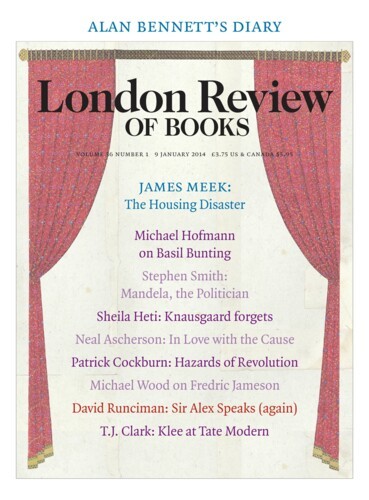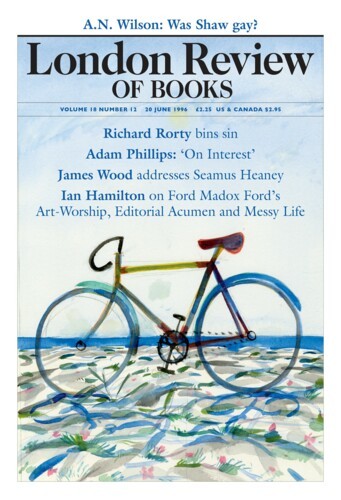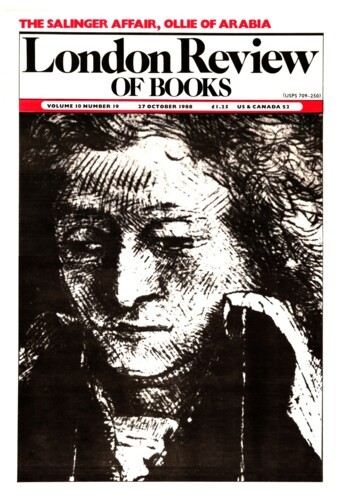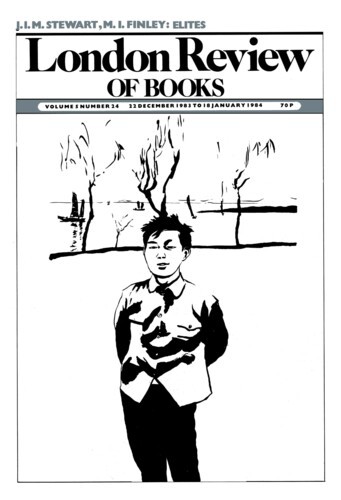Edward Mendelson
Edward Mendelson teaches English and comparative literature at Columbia University. He is the author of Early Auden, published last year.
Many-Modelled
20 June 1996
Diary: Three Joyces
Edward Mendelson, 27 October 1988
The fight over the new Ulysses, like all academic arguments over commas, is a fight between two ideas of human nature, two visions of judgment, two images of eternity.
Loose Canons
Edward Mendelson, 23 June 1988
Frank Kermode’s History and Value reads the literature of the Thirties as ‘a love story, almost a story of forbidden love’. The story is usually told in political terms, but the characters and actions in Kermode’s version and in the conventional version are the same: the poets and novelists who hoped to serve a proletarian revolution that would abolish their privilege and consume their class. In the received version of the ‘Thirties myth’, the middle-class writers who took up left-wing views succeeded only in deceiving themselves and betraying their gifts. In Kermode’s counter-myth, these writers braved a dangerous passage across a social and psychological frontier in the hope of offering their work and their lives to a class that, to them, was a strange and wondrous Other, the image and agent of apocalyptic power. Their border-passages were transgressions. They violated social and artistic tabus. Transgression always evokes pious horror among those who, in Auden’s words, ‘would rather be ruined than changed’. But these transgressions were acts of conscience, imagination and love.
‘Letter to an Editor’
22 December 1983
Pieces about Edward Mendelson in the LRB
Unconditional Looking: Mrs Dalloway’s Demons
David Trotter, 23 October 2025
Virginia Woolf admired Jane Austen above all for her ability to grasp the exceptional moment – ‘in which all the happiness of life is collected’ – as it arises out of and then subsides back into...
Cool Vertigo: Auden Country
Matthew Bevis, 2 March 2023
Many maps have been offered over the years to assist the reader-quester, but if somebody gets a map out in one of Auden’s poems it’s usually because something has gone wrong. In one lyric a lover...
That’s what Wystan says
Seamus Perry, 10 May 2018
What became of his face? In his memorial address Stephen Spender, who had known Auden since they were undergraduates, contrasted the young man, Nordic and brilliant, with a ‘second image...
The Sound of Cracking: ‘The Age of the Crisis of Man’
Pankaj Mishra, 27 August 2015
Mark Greif’s book is a bracingly ambitious attempt at a ‘philosophical history’ of the American mid-century, a chronological account of writers and their ideas. It begins in...
Uncle Wiz: Auden
Stefan Collini, 16 July 2015
Auden loved aphorisms, extracts, notes, lists. It was not just the shortness of short forms that he approved of: he liked their refusal of system even more, their acknowledgment that...
I really mean like: Auden’s Likes and Dislikes
Michael Wood, 2 June 2011
In a poem from the early 1960s, ‘On the Circuit’, W.H. Auden describes himself as ‘a sulky fifty-six’, who finds ‘A change of meal-time utter hell’, and has...
With Slip and Slapdash: Auden’s Prose
Frank Kermode, 7 February 2008
Auden more than once explained that his business was poetry and that he wrote prose to earn his keep while pursuing that ill-paid vocation. Luckily he had another powerful reason for writing...
What Kind of Guy? W.H. Auden
Michael Wood, 10 June 1999
‘That is the way things happen,’ Auden writes in ‘Memorial for the City’, a poem Edward Mendelson dates from June...
Bobby-Dazzling
Ian Sansom, 17 July 1997
W.H. Auden’s first published book review appeared in the Criterion in April 1930, and his first sentence cuts a dash: ‘Duality is one of the oldest of our concepts; it appears and...
Dog Days
Stan Smith, 11 January 1990
The Helensburgh and Gareloch Times for 1 July 1931 reports that, at the Larchfield School Speech Day, ‘the boys entertained the company with two little plays, and their clever acting and...
Auden Askew
Barbara Everett, 19 November 1981
There is an academic myth (vaguely Victorian in feeling but probably, like most Victorian principles, dating back a half-century earlier) that scholars study facts whereas critics make it all up...
Read anywhere with the London Review of Books app, available now from the App Store for Apple devices, Google Play for Android devices and Amazon for your Kindle Fire.
Sign up to our newsletter
For highlights from the latest issue, our archive and the blog, as well as news, events and exclusive promotions.





